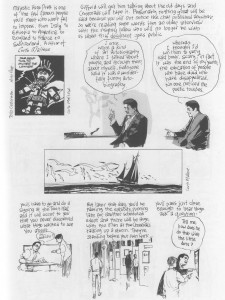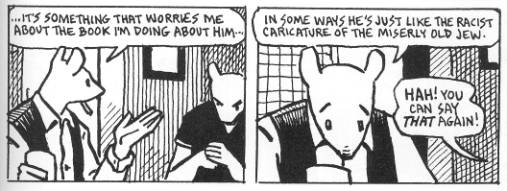Part of the Eddie Campbell-The Years Have Pants Roundtable
This one’s too big to really get a good grasp of. It’s a wizened but lively old cat at 600 pages and 30 years long. You can hold it up by the scruff of its neck with the strength of one hand, but not for any reasonable duration.
Then again, you don’t really need to. There’s a summary provided by the author himself (and who else better to do it) — a pilgrimage to Hugo Pratt’s breakfast table during a comics festival in Sierre, Switzerland. The words are Pratt’s but they weren’t spoken to Campbell during that meeting. Instead, depending on your faith in the narrator, they were taken from an “older interview” with him where he recounts a kind of third person autobiography, which in turn describes everything that we have read up to that point.




